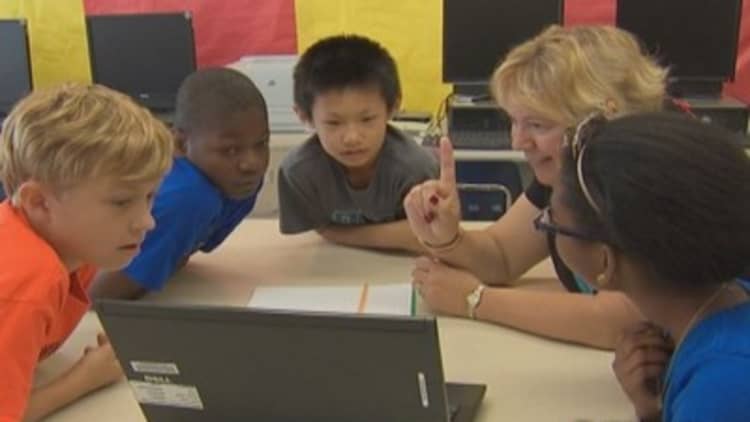
As more schools put an emphasis on financial literacy, the challenge has become finding qualified teachers who can educate young students about the concepts of money.
In response, many states are launching financial literacy training programs for teachers who will do the work that parents are not doing.
"Unfortunately, most parents don't have the background in this and don't feel comfortable with this," said Allen Cox, managing director of the Maryland Council on Economic Education, which instructs teachers on how to better equip their students with economic knowledge and financial literacy.
"Parents are more comfortable talking with their children about sex than talking about money," he said. With parents backing away from talking money, the responsibility falls on the shoulders of educators, Cox said. The Maryland council trained 3,617 teachers in 2013.
Cox, once a teacher himself, joined the council and started teaching a game called The Stock Market Game to teachers for fourth grade and up The online game is a way for students and teachers to learn investing. Cox goes around to different schools to help train these teachers on how to educate their students on personal finance through the game.
"If we can get teachers to have kids realize that when they make a money decision it automatically means that they can't do something else with that money—it's a huge concept that people need to know." Cox said. "What teachers are trying to do is plant the seed. You want every kid that goes through this activity to realize that they must become savers and investors for life."
Read MoreHelping women bridge the financial literacy gap
"Most of (the teachers) come with very little knowledge," said Cox, "and one of the first things I do in every presentation is I tell them 'you don't have to know anything about stocks or bonds or mutual funds or exchange funds in order to have this work for you as a classroom activity.'"
Cox said that he does face some challenges with instructing teachers on financial literacy. Knowledge of personal finance is a very important life skill, but it is hard to get school systems to see it as essential as subjects such as reading and math. Teachers struggle with the knowledge of financial concepts themselves. Financial literacy isn't the most natural subject for teachers to teach, so getting the school to allow time for the training is another issue, Cox said.
Despite the challenges educating teachers on financial concepts, states aren't giving up. The Virginia Council on Economic Education implemented 68 institutes serving more than 1,600 teachers.
Sarah Finley, director of programs for the council, said the 40-hour personal finance institutes receive very strong feedback from teachers in the training. "Many teachers leave with a much greater awareness of the value of this education for their students." Finley said. "They also find that the personal finance institute is helpful for them personally."
Read More What nation has the most money-smart teens? It's not the US
States vary widely on education requirements for personal finance in the classroom. All states include economics standards for kindergarten through 12th grade curriculum, but only six states require testing of personal finance concepts. Among those states are Colorado, Texas, Georgia, Missouri, Michigan and Delaware but a study from the Council for Economic Education shows fewer than 20 percent of teachers report feeling competent to educate on personal finance topics.
Flo Falatko is a fifth-grade teacher at Cromwell Valley Elementary in Towson, Maryland. She started teaching financial literacy to her students 11 years ago. Falatko wanted her students to have more knowledge of personal finance than she did growing up, because she says that some kids just don't grasp the idea that having money is more than whipping out a piece of plastic.
"There were a couple of students who truly felt that if they just went to their parents, the money comes out of their wallet and that was a 'wow' to me," explained Falatko.
Read MoreMaking financial literacy fun
But teachers have a long way to go. In a study by the Program for International Student Assessment on variation in financial literacy performance within countries and economies, the U.S. scored below average at 492 compared with Shanghai with the top mean score of 603.
According to the 2014 Consumer Financial Literacy Survey, when it comes to retirement savings, about 1 in 3 U.S. adults still do not save any portion of their household's annual income.
"Even if it is uncomfortable for teachers to teach it, or for the parents to work with it," said Falatko, it is essential the government push the importance of financial literacy down to the school districts.
—By CNBC's Landon Dowdy






